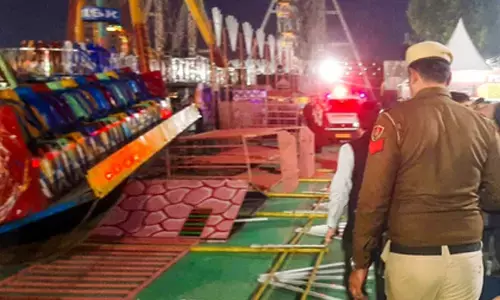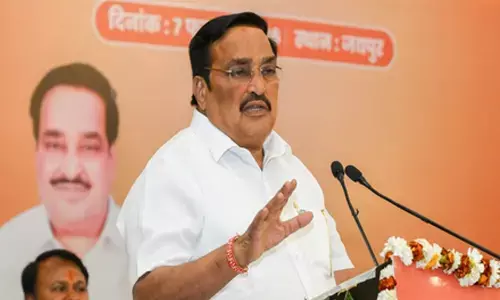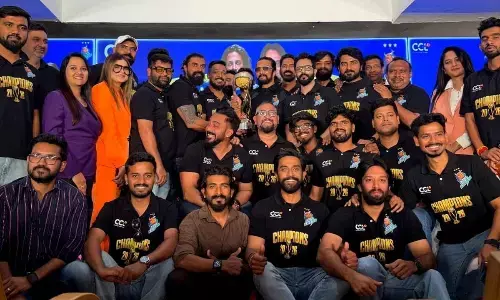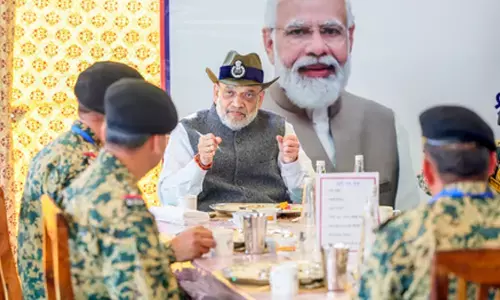Saga of passion, madness, frenzy
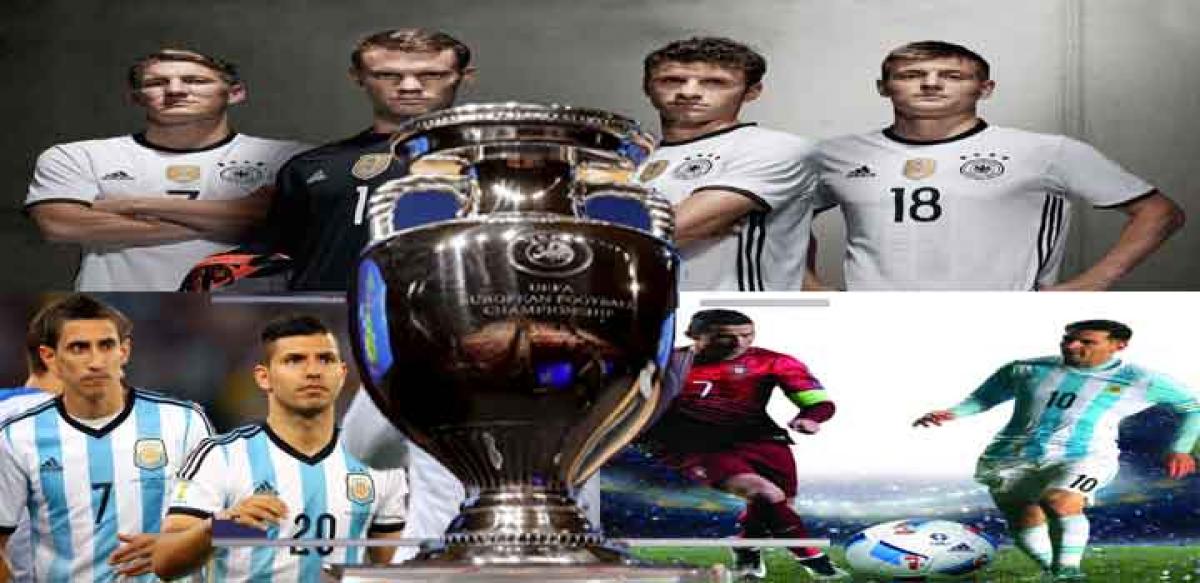
It has been more than five decades but the romance never seems to fade. Moreover, for every four years the love rekindles, it keeps the spirits alive and gives enough memories to feast on till the next union. The past five decades saw dreams being fulfilled, hopes quashed, heroes rising to the occasion, legends bidding farewell, Davids\' beating Goliaths and fairy tale endings aplenty. Welcome to t
It has been more than five decades but the romance never seems to fade. Moreover, for every four years the love rekindles, it keeps the spirits alive and gives enough memories to feast on till the next union. The past five decades saw dreams being fulfilled, hopes quashed, heroes rising to the occasion, legends bidding farewell, Davids' beating Goliaths and fairy tale endings aplenty. Welcome to the UEFA European Championship football, fondly called as Euro.
It isn’t the World Cup and it doesn’t have the flair of Copa America, yet the charm of Euro is palpable and that has been drawing the attention of everyone since its inception in 1960. With the 15th edition of Euro starting from June 10 in France, it is time sit back and take a trip down the memory lane.
Iconic moments
The Euro was never short of hair-raising moments. It was 1988 and the Dutch were playing USSR at Olympiastadion in Munich, Germany. Netherlands’ Arnold Muhren sent in a cross from left that went deep, posing minimal danger to the opposition. However, Marco Van Basten had other plans, he took the ball on the volley and blasted it into the net from an impossible angle and the whole stadium went ballistic. The goal was so iconic in the history of the Euro that the then Dutch captain Ruud Gullit said, “Even if he hits the ball a million times, he would never score the goal again.”
If you are drooling about Leicester City winning the English Premier League and dubbing it as a fairy tale, the Euro was a platform to two such tales, if not three. Of them, the most memorable is that of Denmark’s title winning saga of 1992. The Nordic nation trounced many biggies on their way to glory but not many would have known that they failed to qualify for the Euro and it was only after the then Yugoslavia dropped from the competition, Denmark were called to replace them. The rest was history and the Danes have to thank their stars and big goalie, the legendary Peter Schmeichel, who ‘single-handedly’ ensured that they were in the competition till the end and of course the Yugoslavians.
Later, in 2004 it was Greece. No one gave them a chance, bookies gave crazy odds and even a sloshed fan wouldn’t dare to bet on them to qualify for the knockouts let alone win the tournament. But, it is football and upsets do happen; the determined Greeks persevered with their defence at all costs approach and won the title.
Until 2008 Spain never made it big. It had talented players and played free-flowing attacking football but failed to produce the magic that required, to win titles. It all changed in the Euro; not only they won it that year, it sparked half-a-decade of Spanish dominance in world football that saw them lifting the World Cup in 2010 and retaining the Euro title in 2012.
New format
For the first time, Euro 2016 will have 24 teams, having been expanded from the 16-team format used since 1996. Under this new format, the teams will contest a group stage consisting of six groups of four teams each, followed by a knockout stage of three rounds and the final. The matches will be played in ten stadia in ten cities: Bordeaux, Lens, Lille, Lyon, Marseille, Nice, Paris, Saint-Denis, Saint-Étienne and Toulouse.
The hosts, France are drafted into the easiest groups of the tournament. They along with Albania, Romania and Switzerland will make Group A. With the likes of players like Antoine Greizmann, Paul Pogba and vociferous home support their qualification from group stages is said to be a cake walk. However, the team selection is riddled with controversies and it is alleged that players like Karim Benzema and others were not selected because of racism, a claim supported by French legend Eric Cantona.
Group B has England, Russia, Wales and Slovakia pitting against each other. English coach Roy Hodgson picked a young team with the likes of Eric Dier, Dele Alli, Marcus Rashford, Harry Kane and others, while they are expected to qualify from the group, the same cannot be said about others. Alan Dzagoev, who has been a live wire for the Russians, misses the tournament and they are not the same team without him and the Welsh are dependent on Gareth Bale and Aaron Ramsey. Although Napoli’s playmaker Marek Hamsik is the mainstay of the Slovaks, the rest aren’t cut out from the same cloth as him.
Group C has tournament favourites Germany competing with Ukraine, Poland and Northern Ireland. Marco Reus is perhaps the most unlucky football player on the planet, he missed the World Cup in 2014 with injuries and it was the same this time around for the Euro.
However, the world champions will barely miss him as Coach Joachim Low has selection headache of a nice kind with hordes of talent at his disposal. Meanwhile, the Polish are pinning their hopes on striker Robert Lewandowski to guide them through the group stages. Ukraine and Northern Ireland has no swash-buckling players and it is unlikely to see an upset from this group.
Group D has defending champions Spain against Czech Republic, Croatia and Turkey. After a dismal performance in World Cup 2014, the Spanish team are itching to regain their dominance by retaining their title. However, they are plagued by striker and defence woes.
Moreover, they are in one of the two toughest groups and the La Furia Roja has to produce their best football to escape from an upset. Czech Republic, Croatia and Turkey are balanced sides with several stars in their teams and this group will definitely be an interesting watch.
Another tough group in the competition is Group E, which as Belgium, Italy, Sweden and Republic of Ireland. While the Irish are the minnows, Belgium, Italy and Sweden will sweat it out to qualify from the group. With this tournament being most probably the last international tournament for maverick striker Zlatan Ibrahimovic, all eyes are on the tall Swede and fans are hoping that ‘Ibra’ will woo them with bicycle kicks.
Portugal, Austria, Iceland and Hungary form Group F. Christiano Ronaldo, who has been carrying the mantle of the team single-handedly, will be aided young talent, who will be more than willing to share the load. It would be interesting to see, how far the team would go.
Odds in the favour of France
Statisticians have predicted that France would be the most likely winner of the tournament defeating defending champions, Spain in the final. By applying their statistical model based on bookmakers' odds, the team of researchers previously correctly predicted the 2008 Euro final and Spain as the 2010 FIFA World Cup Champions and the 2012 Euro Champions.
According to this model developed by the researchers, France will be the most likely winner of the tournament in 2016 with a winning probability of 21.5 per cent, closely followed by Germany with a winning probability of 20.1 per cent. The defending European Champion Spain follows with 13.7 per cent, while England and Belgium are the "best of the rest" with lower winning chances of 9.2 and 7.7 per cent respectively.
Terror alert
Meanwhile, The United States Department of State warned its citizens planning a visit to European nations this summer that there might be a threat of terror attacks across Europe, particularly public places including the venue of the 2016 Euro. The department, however, does not have specific information on the threat.
"The Euro Cup stadiums, fan zones, and unaffiliated entertainment venues broadcasting the tournaments in France and across Europe" could be potential targets for terror attacks, the state department said in an alert. However, this warning might not dent fan frenzy.
Bizarre moments
Euro is not short of bizarre moments, the most notable of them is English legend Paul Gascoigne’s (Gazza) dentist chair celebration. Gazza mocked criticism of his drinking habits after netting his brilliant goal against Scotland in 1996. With 12 minutes left in a group-stage game at Wembley, the England midfielder flicked the ball over Colin Hendry with his left foot before slamming in with his right. Gazza lay behind the goal as his team-mates squirted water into his mouth, a re-enactment of the ‘dentist's chair’ drinking game which made headlines ahead of the tournament.
Another bizarre moment that one cannot even imagine happening now is a team winning by a coin toss. Italy found their way to the final of Euro 1968 courtesy of a coin toss held in a Naples dressing room. The two teams could not be separated from a goalless deadlock after 120 minutes of play and so it came down to Italy captain Giacinto Facchetti’s correct call of tails to send his team through from the semi-final. Facchetti then emerged from the tunnel to effectively inform the 68,000 watching fans of the result with his celebrations.
Centenary Copa America
While we are waxing lyrical about the Euro, Copa America is celebrating its centenary. However, much to the chagrin of many a football fan the tournament is being played in the US. The first Copa America was held in 1916 in Argentina and won by the hosts' neighbours Uruguay. The tournament represented a developmental moment in the global game – a vehicle for South American countries to raise playing standards and generate more interest in the Anglo-Saxon sport.
In fact, Brazil and the Rio Plata countries greatly benefitted from the continental competition, so much so that Uruguay won the 1924 Olympic medal for football in Paris. They shook the European teams and steamrolled their way to the gold, a feat they came close to repeating four years later in Amsterdam, where they won the silver instead. The European football establishment was flustered yet again – how could any team play with such elegance and beauty?
Who will win?
Chile won the tournament, last year on home soil. It was Alexis Sanchez brilliance coupled with composed heads during the penalty shoot-out in the final over Argentina that helped them to lift the cup. However, the team isn’t the same this time around with Coach Jorge Sampaoli leaving the side.
Argentina is touted as favourites and they have everything to prove as they haven’t won a continental title since 1993. With the golden generation of Argentina nearing thirties and some in their twilight, it is time for the likes of Lionel Messi, Angel Di Maria, Javier Mascherano and Sergio Aguero to win a title, else they will be branded as great footballers, who haven’t won anything for their country.
Brazil is still recovering from their cataclysmic 7-1 semi-final defeat to Germany in the last World Cup. Coach Dunga is an anachronism and a tactical dinosaur that hasn’t advanced Brazil’s posture and poise. The team is settled but has neither genuine playmaking midfielders nor a fixed striker. Barcelona has prohibited Neymar from participating, did the Catalonian giants quashed Brazil’s dreams, only time will tell.
One cannot ask for a better monsoon with two major tournaments and a host of matches featuring the biggest names in the football fighting for glory. Football fans for sure will drool over deft touches, incisive passes, swift turns, gazelle-like sprints, jaw-dropping dribbles and the list never ceases to end.
However, it remains to be seen whether these tournaments would produce iconic or bizarre moments. Every football fan would like to see a Panenka moment from these tournaments. It is perhaps the most famous winning penalty kick ever; Antonin Panenka had the chipped spot-kick named after him with the decisive lob in the 1976 Euro final.
The Czech midfielder had the chance to win the tournament for his country. Panenka let German goalkeeper Sepp Maier dive to his left before chipping down the middle. The Panenka penalty was born.
By:Aditya Parankusam











